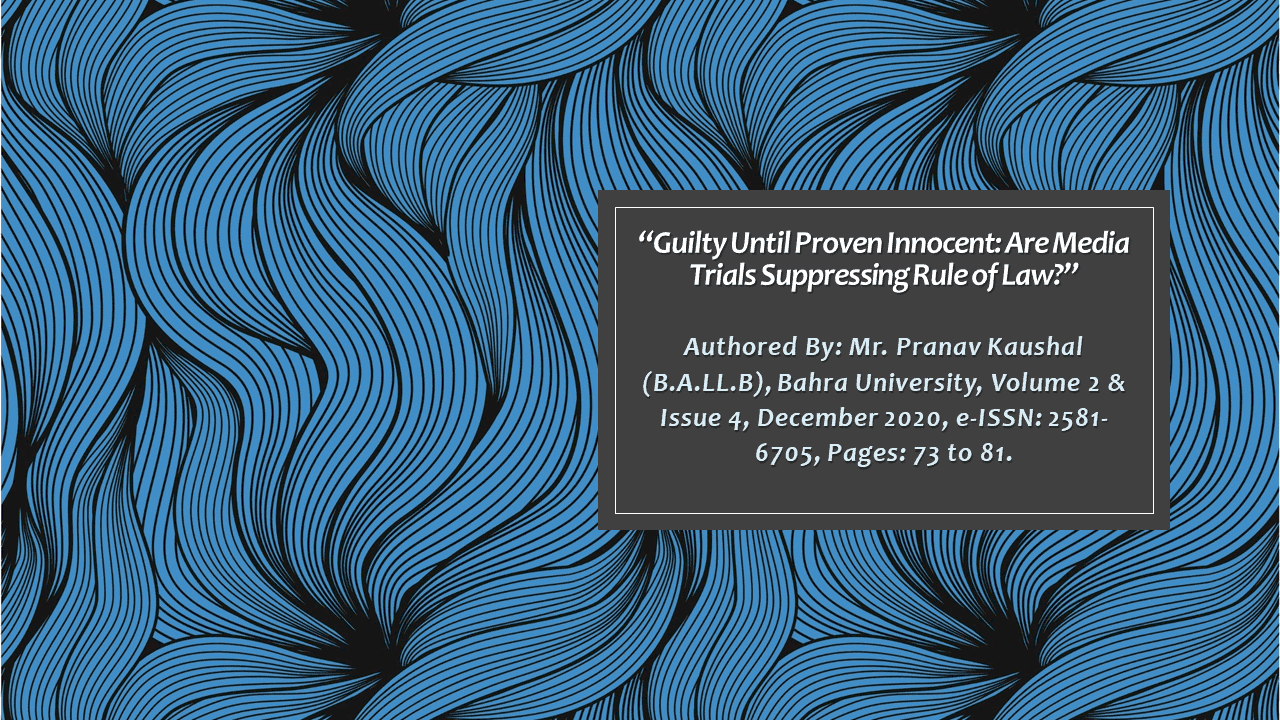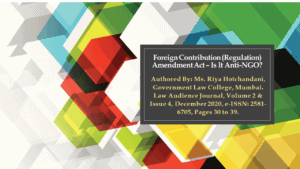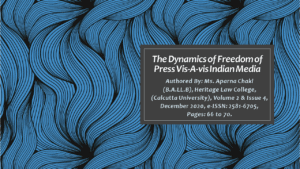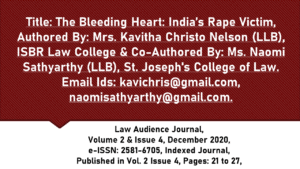Click here to download the full paper (PDF)
Authored By: Mr. Pranav Kaushal (B.A.LL.B), Bahra University.
Click here for Copyright Policy.
Click here for Disclaimer.
I. INTRODUCTION:
On 26th November 2020, we celebrated 70 years of the Constitutional Governance with Damocles sword of press freedom that could prove guilty unless proven innocent. The Fundamental Right of freedom of speech and expression is very essential in a democratic country like India and so is the freedom of the press. Freedom of the press has been a debatable issue especially when it involves scrutinising a fair trial. To preserve the true essence of democracy which is based upon the concept of rule of law it is essential that the citizens must have the fundamental right to express their feelings and opinions. The power of media has been realised globally but many sought to regulate such power by limiting its right to criticise, by putting a ban on publication and broadcasting and last but not the least using media as a tool of communal disharmony or propaganda to win the elections.
Development of news reporting in India in the past few months, culminating into coverage of Sushant Singh Rajput case has brought into the limelight the issue regarding the manner in which the media should be regulated when it comes to reporting to ongoing criminal investigations and trials. Media today is not what it was then. The role of media has not only changed adamantly but now it has become a part of investigative journalism which has started interfering in the functioning of the court. Media freedom and alluring sounds of its anchor has the ability to turn a villain into a hero or vice versa which is enough to destroy or create a person’s position in the society. “Nowadays Media houses are acting like a public court and have started to interfere with the proceedings of the court and have created wide rift of gap between the accused and convict keeping at stake the golden principle of, ‘Presumption of Innocence until Proven Guilty’ and Establishing Guilt beyond the Reasonable Doubt.[1]”
This essay attempts to analyse the impact of Media Trial and how it takes freedom of speech and expression as a garb to continue undue interferences with the administration of Justice.
II. ARE MEDIA TRIALS SUPPRESSING RULE OF LAW?
“Despite the significance of the print and electronic media in the present day it is not only desirable but the least that is expected of the persons at the helm of affairs in the field, to ensure that the trial by the media does not hamper fair investigation by the investigating agency and more importantly does not prejudice the right of defence of the accused in any manner whatsoever. It will amount to travesty of injustice if either of this causes impediments in the accepted judicious and fair investigation and trial. Presumption of innocence of an accused is a legal presumption and should not be destroyed at the very threshold through the process of media trial and that too when the investigation is pending. In that event, it will be opposed to the basic rule of law and would impinge upon the protection granted to an accused under Article 21 of the Indian Constitution. It is essential for the dignity of the courts and is one of the cardinal principles of the rule of law in democratic society that the criticism or even the reporting particularly in sub judice matters must be subjected to check and balances so as not to interfere with the administration of justice.[2]”
In today’s scenario what we can see is that the media houses are acting as a public court and started to interfere with the proceedings of the court. Trial by Media is a term which refers to the role of media acting as a judge or overriding the justice delivery system by way of distorting, sensationalising, prejudicing, instigating public and derailing the justice delivery process by stream rolling of the right of accused to have fair trial. More commonly media trial can be understood as an expression of speech used by the media which provoke public hysteria which is more akin like the mob lynching that makes fair trial impossible as it affects the reputation of person regardless of the final verdict of the court.
In R.K Anand v. Delhi High Court[3] the Supreme Court observed that, “The impact of television and newspaper coverage on a person’s reputation by creating a widespread perception of guilt regardless of any verdict in a court of law. During high publicity cases, the media are often accused of provoking an atmosphere of public hysteria akin to lynch a mob which not only makes only fair trial impossible but means that regardless of the trial, in public perception the accused is already held guilty and would not be able to live the rest of their life without intense public scrutiny.”
Freedom of press is vital for democratic setup as it serves the opinion of the public without any bias. The primary objective of media is to serve people by dissenting correct information regarding matters concerning public interest. A free media acts as a watchdog over the government and is the sole channel to connect people with the government. The media has apparent influence on the minds of the people and can mould their decisions. It may lay down an agenda for the nation and pursue it. The media has an influential impact on society that it can on no ground lose sight of its duties and obligations towards people. So they are mandated to follow ethical guidelines ensuring the authenticity of the news an impartial but decent reporting. They are also required to take into account the cascading effect of their reporting on the society and concerned individual or institutions as the case may be. Media should be neutral in imparting information to the society rather than conducting trials. The difficulty reaches in its peak when there has been an extensive coverage by the media on the matters that are sub judice. The information and opinions published by the media houses apparently prejudice the interest of the parties in a case which is pending before court. The media being a public service is supposed to act as a watchdog of the society while judiciary on the other hand has to safeguard the rights of the citizens.
Both judiciary and media are important for the progress of civil society and role of media and judiciary should be independent of each other. But however, since past few years’ media has started interfering in the court proceeding and it started the concept of investigative journalism in order to mould the opinion of public. Thus, the issue of Media Trial is a serious issue and needs to be addressed. The freedom of press should not be such that it causes harm to the individual or to the society at large. Media should be responsible for their conduct and for its freedom as freedom under Article 19(1) (a) of the Indian Constitution is not absolute.
III. FREEDOM OF PRESS IN INDIA VIS-A-VIS FREEDOM OF SPEECH AND EXPRESSION:
“In the country like India we consider the rights of the press to be at such level of eminence that we do not want to curtail them; no statute can curtail them, but that does not mean there is complete lawlessness; there should be self-regulations”- Justice Uday Umesh Lalit[4]. Freedom of press is fundamental to a democratic society. The press provides the platform for a multiplicity of voices to be heard.
At the national, regional and local level, it is the public watchdog, activist and guardian as well as educator, entertainer and contemporary chronicler. This freedom of press is not expressly mentioned anywhere in the constitution but it is impliedly referred in Article 19(1) (a) of the Indian Constitution i.e., Freedom of speech and Expression. The freedom of press is regarded as a “Species of which freedom of expression is a genius. Thus, being only a right flowing from the freedom of speech the freedom of press in India stands on no higher footing than the freedom of speech of a citizen.”
The Indian Press Commission said that, “Democracy can thrive not only under the vigilant eyes of its legislature, but also under the care and guidance of public opinion and the press is par excellence, the vehicle through which the opinion can become articulate.”
The Apex Court of India has emphasised various cases for maintaining freedom of press in a democratic society. In Indian Express Newspaper (Bombay) Pvt. Ltd. v. Union of India[5] the court was of the observation that, “In the press, various articles and news are being published frequently which brings about the weak points of the government and many times the government tries to suppress the freedom of press. It is, therefore, the primary duty of the court to uphold the said freedom and invalidate all laws and administrative actions which interfere with the freedom of press contrary to the constitutional mandate.”
In Romesh Thapar v. State of Madras[6] it was observed that “the freedom of speech and of the press lay at the foundation of all democratic organisations, for without free political discussions no public education, so essential for the proper functioning of the process of the popular government is possible.”
Printers (Mysore) Ltd. V. Assistant Commercial Tax Officer[7] the Supreme Court observed that, “the democratic form of government itself demands its citizen’s active and intelligent participation in the affairs of the company. The public discussion with people participation is the basic feature and the rational process of democracy.”
In LIC of India v. Manubhai D Shah[8], it was held that, “Every Citizen has an undoubted right to lay what sentiments he pleases before the public. Freedom to air one’s view is the lifeline of any democratic institutions and any attempt to stifle, suffocate or gag this right would sound death knell to democracy and would help usher in autocracy or dictatorship.”
In Maneka Gandhi v. Union of India[9] Justice Bhagwati has highlighted on the importance of the Freedom of speech and expression as under;
“Democracy is based essentially on free debate and open discussions, for that are the only corrective of government action in a democratic setup. If democracy means government of the people, by the people it is obvious that every citizen must be entitled to participate in the democratic process and in order to enable him to intelligently exercise his right of making choice, free and general discussion of pubic matters is absolutely essential.”
After going to the above observation of the Apex Court one can find that in India the “Freedom of press cannot be restricted unless such restriction is not excessive or reasonable one. It the need of hour to preserve and maintain the freedom of press but at the same time it is also necessary to put some kind of restrictions on freedom of press which are permissible on their freedom. The restrictions cannot be unreasonable on the ground mentioned under Article 19(2) of the Constitution of India which is the only grounds for imposing a limitation on the freedom of speech and expression.”[10]
IV. WHAT SHALL BE THE ROLE OF MEDIA IN DEMOCRATIC SOCIETY?
“In the darkness of secrecy, sinister interest and evil in every shape are in full swing. Only in proportion as publicity has place can any of the checks applicable to judicial injustice operate. Where there is no publicity, there is no justice. Publicity is the very soul of justice. It is the keenest spur to exertion and surest of all guards against improbability. It keeps the judge himself while trying under trial.”[11] The Apex Court of India in many landmark cases have made emphasis about the right of the people to know and the fundamental principle behind is the freedom of press. The Supreme Court[12] stated that, “The primary function therefore of the press is to provide comprehensive and objective information on all aspects of the country’s political, social, economical and cultural life. It has an educative and mobilising role to play. It plays a very important role in moulding the public opinion.” To promote transparency and accountability is the main role of the media but what is more required from an independent media is that the freedom of press shall be utilised for the good of the public rather than influencing the mind.
In Constitutional Assembly Debates, Dr. Bhim Rao Ambedkar was of the opinion that, “Press has no special rights which are not to be given or which are not to be exercised by the citizens in his individual capacity. The editor of press or manager is merely exercising the right of the expression and therefore no special mention is necessary of the freedom of press.”[13] Thus the freedom of press is not absolute and they are too subjected to certain reasonable restrictions mentioned under Article 19(2) of the Indian Constitution. Freedom of speech and expression does not provide a licence to the media to investigate, broadcast or publish anything without any restrictions. It is the duty of the media to make sure that the information received by them shall be accurate and does not in any way affects the right and reputation of others.
V. TRIAL BY MEDIA AND ITS AFFECT ON PRIVACY, REPUTATION AND FAIR TRIAL:
“Every institution is liable to be abused and every liberty, if left unbridled has the tendency to become a licence which would lead to disorder and anarchy.”[14] In India the media houses have transformed themselves into a “Populace Court” popularly known as Janta Ki Adalat. The reason for introducing the trend of Media Trial is not for the purpose of public interest but what public is more interested in is more important. The sudden death of the Bollywood Actor Sushant Singh Rajput sent shock waves through the country. This sudden death has brought negative result of the trial by media to light.
Some of the media houses have dishonourably and openly declared Bollywood actors and actresses guilty, profusely ignoring the principle of criminal law, which is the principle of presumption of innocence. Thus, it can be rightly said that media has reincarnated itself into a public court and it does not make any suggestive innuendos but direct allegations. Investigative journalism which is the new trend happens to create new problem when reporting on sensitive cases is done from a particular prism and to support a particular opinion or point of view.
The apex court of India with regard to the media trial has observed that, “Law has established the procedure according to which the trial of an accused person is to be conducted and the trial by media is contradictory to the rule of law. This may result in the miscarriage of justice. A judge should never get influenced by such pressures and strictly follows the rule of law. Once a judge finds out that the person is guilty of an offence then the question relating to the sentence to be awarded should be addressed by himself and it must be according to the provision of law.[15]”
Justice H.R Khanna with regard to the Media Trial, was of the observation that, “Certain aspects of the case are so much highlighted by the press that the publicity gives rise to strong public emotions. The inevitable effect of that is to prejudice the case of one party or the other for the fair trial. We must consider the question as to what extent are restraint necessary and have to be exercised by the press with the view to preserving the purity of the judicial process. A line of balance the whole of thing has to be drawn at some point. It also seems necessary in exercising power of contempt or legislature Vis-a Vis the press that no hypersensitivity is shown and due account is taken of the proper functioning of a free press in a democratic society. This is vital for ensuring the health of democracy. At the same time the press must also keep in view its responsibility and see that nothing is done as may bring the courts or the legislature into disrepute and make the people lose faith in these institutions.”
In Saibal Kumar Gupta v. B.K Sen[16] The Supreme Court held that, “no doubt it would be mischievous for a newspaper to systematically conduct an independent investigation into a crime for which a man has arrested and to publish the results of that investigation. This is because trial by newspaper, when a trial by one of the regular tribunals of the country is going on must be prevented. The basis for this view is that such action on the part of newspaper tends to interfere with the course of justice whether the investigation tends to prejudice the accused or the prosecution. There is no comparison between a trial by a newspaper and what has happened in this case.”
Article 12 of the Universal Declaration of Human Rights states, “No one shall be subjected to arbitrary interference with his privacy, family, home or correspondence or to attacks upon his honour or reputation. Everyone has the right of protection of the law against such interference or attacks.”
The Apex Court of India in R. Rajagopal v. State of Tamil Nadu[17] observed that, “a citizen has a right to safeguard the privacy of his own, his family, marriage, procreation, motherhood, child bearing and education among other matters. No one can publish anything concerning the above matter without his consent, whether truthful or otherwise and whether laudatory or critical. If he does so he would be violating the right of privacy of the person concerned and would be liable in an action for damages. Position may however be different if a person voluntarily thrusts himself into controversy or voluntarily invites or raises a controversy.”
VI. CONCLUSION:
“Media must show conscious efforts towards responsibilities to the public which they should elevate by building public trust and confidence about their trustworthiness and should follow the ethics to assert its reliability beyond any speculation.”
The importance of a free press and a strong media in a true democracy is undeniable. No democracy can work without an effective media in place. The media has a lot of power and if this power is misused it can severely harm a nation. No external body can be set up to check the media professionals and ensure that they are not doing harm than good. Freedom should not be absolute and the rule of law ensures that nobody has arbitrary power applies to the media as well.
“There should be some reasonable restrictions on Media so that it does not infringe other’s right and court should be the one laying down the Lakshman Rekha on the Media that should not be crossed.”
[1] Arunav Talukdar, “Media Trial And Right To Freedom Of Speech And Expression: An Analysis” National Law University Assam (November 25, 2020 10:00AM) http://www.dlnluassam.ndl.iitkgp.ac.in/bitstream/handle/123456789/171/Arunav%20talukdar%20Diss%202018.pdf?sequence=1&isAllowed=y.
[2] Manu Sharma v State (NCT of Delhi) (2010)6 S.C.C. 1 (India).
[3] R.K Anand v Delhi High Court (2009) 8 S.C.C. 106 (India).
[4] Financial Express, “ Media mustself-regulate when reporting on criminal trial, Says Supreme Court Justice UU Lalit” (September 08,2018 11:57PM) https://www.financialexpress.com/india-news/media-must-self-regulate-when-reporting-on-criminal-trial-says-supreme-court-judge-uu-lalit/1307007/.
[5] Indian Express Newspaper (Bombay) Pvt. Ltd. v. Union of India A.I.R 1986 S.C 515 (India).
[6] Romesh Thapar v State of Madras A.I.R 1950 S.C.124 (India).
[7] Printers (Mysore) Ltd. v Assistant Commercial Tax Officer (1994) 2 S.C.C. 434 (India).
[8] LIC of India v Manubhai D Shah A.I.R. 1993 S.C. 171 (India).
[9] Maneka Gandhi v Union of India A.I R 1978 S.C. 597(India).
[10] Supra Note 1.
[11] Anil B. Diwan, “Making Judiciary more transparent” The Hindu, (April 21, 2016 02:40 AM) https://www.thehindu.com/opinion/lead/making-judiciary-more-transparent/article6277602.ece.
[12] Harijai Singh and Anr. v Unknown A.I.R 1997 SC 73, Vijay Kumar v Union of India (1996) 6 S.C.C.466 (India).
[13] Dr. Ambedkar‟s Speech in Constituent Assembly Debates, VII, 980.
[14] Express Newspapers v. Union of India (1997) 1 S.C.C. 133 (India).
[15] State of Maharashtra v. Rajendra Jawanmal Gandhi, 1997 (8) S.C.C. 386 (India).
[16] Saibal Kumar Gupta and Others v B.K Sen and Another A.I.R. 1961 S.C. 633 (India).
[17] R. Rajagopal v. State of Tamil Nadu A.I.R.1995 S.C.264 (India).



